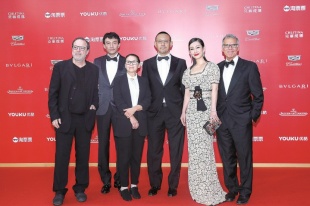China's movie market gains new ground


Feng Wei, the Greater China president of the Motion Picture Association of America, says that North America, China and the rest of the global market now each account for nearly one-third international box office takings.
In an exclusive interview with China Daily during the Shanghai festival, Jeff Robinov, a veteran Hollywood film producer who collaborated with China's Fosun Group and Sony Pictures to set up multiplatform media company Studio 8, suggested that one of the factors behind China's rise is the aggressive marketing efforts undertaken to promote domestic movies.
Robinov, who served as the president of Warner Bros from 2007 to 2013, said that Chinese corporations are also playing a part in this growth, having leveraged their resources to bring more overseas films to China, as well as introduce Chinese artists and productions to the global market.
In the past decade, the cost of production has gone up and this has resulted in films being financed by multiple studios instead of a single entity, said Robinov.
Studio 8, for example, was just one of the many parties, including The Ink Factory, Tri-Star Production, LStar Capital and Bona Film Group, that backed American Chinese director Ang Lee's experimental film Billy Lynn's Long Halftime Walk in 2016.
The film, which was shot at 120 frames per second, resulting in extreme clarity, failed at the box office, bringing in just $30 million worldwide against a budget of $40 million. Most films are shot at 24 frames per second.
However, Li Haifeng, senior vice-president of Fosun International and president of Fosun Film Group, maintains that the movie was far from being a failure.
"We identify with Ang Lee's dedication to continuously exploring new possibilities of filmmaking, and hope to have long-term collaboration with the director," says Li.





































